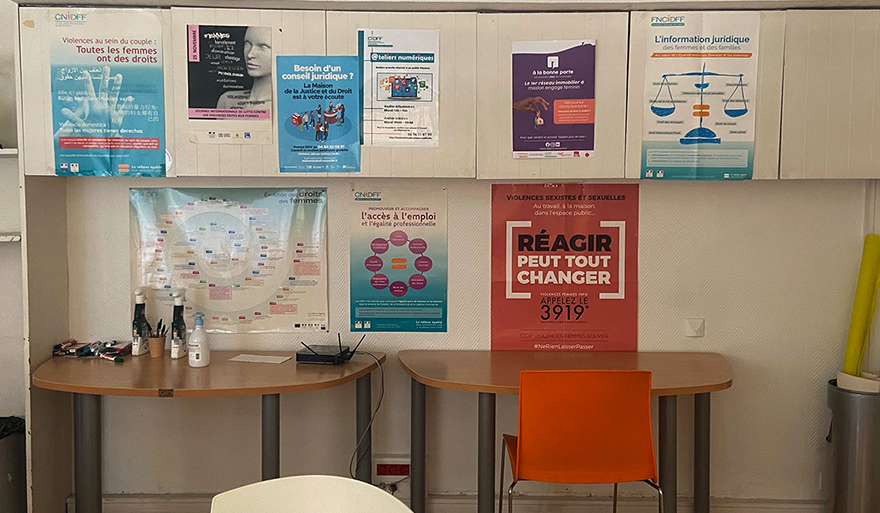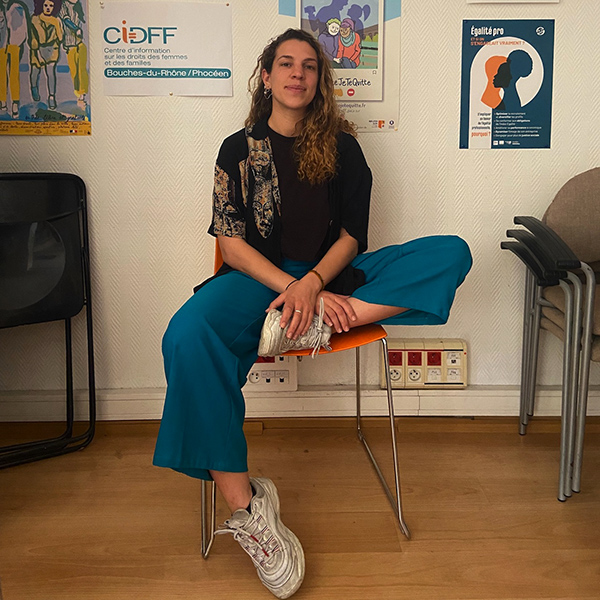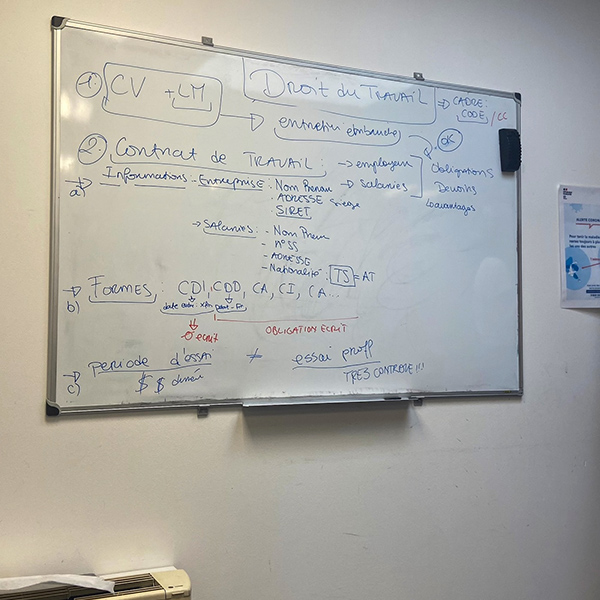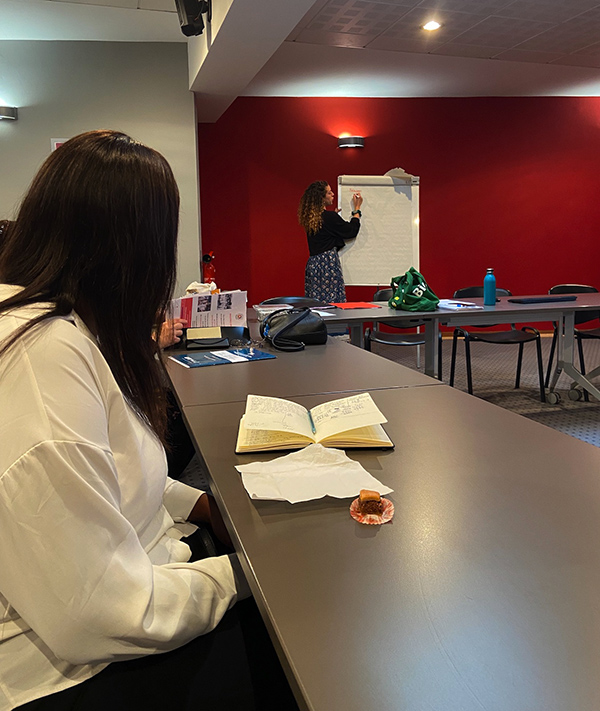Egalipro workshops, an oasis of trust for women in Marseille
Since 2018, the CIDFF (Information Centre on Women's and Families' Rights) in Marseille, France, has been running workshops for female jobseekers. The goal is to give them the keys to (re)joining the working world.

Marseille (France)
"Beyond questions of money, having a job is a means of emancipation for women. It boosts their self-confidence and allows them to exist for themselves, outside of their family", says Clara, who manages the Egalipro project at the Marseille CIDFF.
At the job-coaching service of this association – which has branches throughout France – female career counsellors follow women individually and in groups as they look for a job. The aim? “To help them overcome all the obstacles that stop them entering or returning to the world of work," says Clara.

The Egalipro programme consists of four-day group workshops which cover a wide range of topics such as self-esteem, the importance of networking, and employment law. The aim is to provide the women with the keys that open the doors to jobs that are sometimes locked for those who do not master the codes. The programme is financially supported by the European Social Fund (ESF).
On Thursday 5 May, it is the employment-law workshop at the Cité des Métiers in Marseille's 2nd arrondissement. Several women have arrived early and are getting to know each other by discussing their children, their husbands or their job hunt. Once all the attendees have arrived – there are three today – Marija gently interrupts them to introduce herself. She is the CIDFF legal expert who will be leading today's workshop. She reminds us of the rules to be respected in the group: "do not interrupt; listen to each other; respect each other's words; do not judge; speak in the first person; respect people's right to silence; confidentiality; mutual help".
Marija's first question: "What is the law, in your view?” "It's what belongs to us", Faïza* replies immediately. The young woman, who is almost thirty, grew up in Senegal with her nine brothers and sisters. Divorced, she is raising her 7-year-old daughter alone.

Marija explains: "Labour law is the set of rules that governs work. Within this framework, you have obligations, but also rights that can be advantages – like maternity leave – or prohibitions, like discrimination. We are here to inform you about all this." Fatima's response: "Well, that's good because I certainly need it!" The young Senegalese woman was a victim of harassment in her previous job, a subject she prefers not to talk about in detail. Today, this single mother wants to become a care assistant.
Discriminated
The discussion drifts towards the subject of discrimination. Each of the women has a story to tell on this subject. Faiza recounts: "Recently, I wanted to train to become a security guard. I was asked if I had children and if I was married. I answered because I am honest. Then I was asked, 'But are you sure you're going to be on time?'. And in the end I didn't get into the course." On hearing the story, Marija exclaims: "This kind of behaviour is not legal! Do you think a man would be asked that kind of question?"
Since some women are wearing the hijab, the young counsellor chooses to elaborate on this complex subject in the French workplace. She concludes by remarking, "That's why you shouldn't always believe everything that certain television channels say about these issues." Sandra* replies with a burst of laughter, "Oh, that's all right, they are giving us free advertising!"
Sandra studied accounting. Of Tunisian origin, she arrived in Marseille 25 years ago. Like Faiza, she is divorced and is raising her 13-year-old daughter alone. Sandra, like all the other women here, has faced difficult challenges, from harassment to discrimination. Yet her sense of humour seems unaffected. It is a way of "de-dramatising life's tragedies".
Next it's time to talk about CVs. Marija explains: "The only information that is legally necessary is the telephone number, education and work experience. Everything else is not compulsory." Sandra, the Tunisian, laughs: "Oh yes, I never put a photo on it. That's the surprise! I have a first name that works everywhere. But then, when people see my face, the name doesn't fit anymore. In interviews, I've often been asked what my religion is."
"You see," insists Marija, "that's not alright! The employer is not supposed to ask you about your private life. They should hire you for your skills and that's it!" And if the rule is not respected? "You can lodge a complaint or go to the Human Rights Ombudsman," she says.
Restored confidence
This Tuesday, 10 May 2022, still at the Cité des Métiers, there is a workshop entitled "My resources, my successes". Clara, the Egalipro project manager, leads it. The same women are present, with only one newcomer, Zahra*. Wearing a headscarf, the fifty-year-old Algerian is bright and communicative. She arrived in France about ten years ago. With a four-year degree in chemistry, this mother of a 17-year-old boy is looking for work as a pharmacy assistant.

Today, she has brought along some oriental pastries which she offers to everyone present. When the subject of self-esteem is raised, Zahra gives a spontaneous answer: "I was shy before. I didn't speak. I was always hesitant. Thanks to the CIDFF – I will tell them this all the time – I have had my self-confidence boosted!"
During the workshop, Clara suggests an activity. "See that box over there on the table? Each of you in turn is going to look at the photo of the famous person in it and give them three compliments." Sandra, the first to go, jumps into action. She glances inside and looks up in surprise. "But it's a mirror!"
The workshop leader, smilingly satisfied with the success of her ruse, explains the exercise. "Find three qualities for yourself and then each of us will also give you three qualities that you hadn't thought of." There follows a moving scene of sisterly solidarity in which each participant receives a shower of compliments.
"There is a lot of sharing between these women," comments Clara. "Often they don't know each other when they arrive, but at the end of the group workshops, they leave as friends. They have had similar difficulties in life, so they can understand and help each other."
Faced with these women and their bottled-up traumatisms, it can be difficult for CIDFF employees to find the right position. "Today’s society," Clara admits, "does not always protect women well in the face of the many forms of violence they suffer. Since it is systemic, sometimes there is little we can do personally and it's very frustrating."
To keep a professional distance, the young woman uses the formal form of address when speaking to the women she accompanies. "We are not superheroes or magicians, or even social workers or psychologists," concludes Clara. "But we do listen to these women, we believe them and we try to help them as best we can. We feel like we are making an impact."
*First names have been changed, to protect the confidentiality and anonymity of the participants
 This article was produced as part of the Union Is Strength competition, organised by Slate.fr with the financial support of the European Union. The article reflects the views of the author and the European Commission cannot be held responsible for its content or use.
This article was produced as part of the Union Is Strength competition, organised by Slate.fr with the financial support of the European Union. The article reflects the views of the author and the European Commission cannot be held responsible for its content or use.